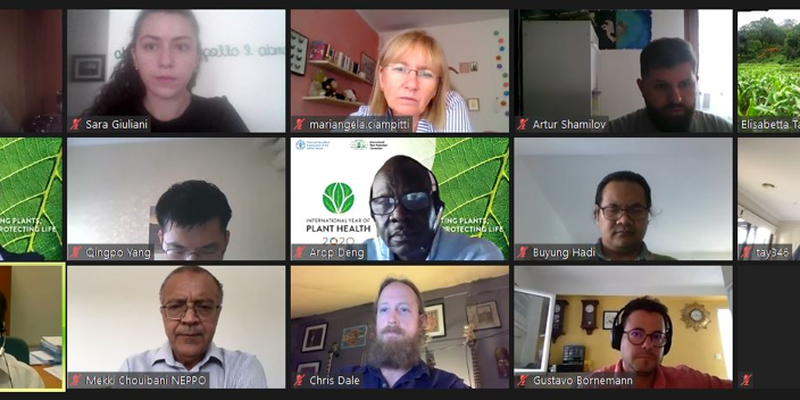The FAO/IPPC Fall Armyworm Technical Working Group successfully conclude its 3rd virtual meeting
Posted on Tue, 29 Sep 2020, 08:13

Rome, 16 September 2020 – The FAO/IPPC Fall Armyworm (FAW) Technical Working Group of Quarantine and Phytosanitary in relation to Trade keeps moving forward its work programme in relation to the FAO Global Action for FAW Control and met for the third time on Wednesday, 16 September. During his opening remarks, Mr Jingyuan Xia, Director of the FAO Plant Protection and Production Division (NSP), highlighted the importance of maintaining a coordinated approach to implement the FAW Global Action as broadly and effectively as possible.
In particular, Mr Xia stressed the necessity of adopting a top-down approach during the first implementation phase of the Global Action, while moving to a bottom up approach during the second phase. According to the NSP Director, this strategy will help intercept needs and challenges from farmers and rural communities, and bring them to the attention of national phytosanitary authorities and then regional plant protection organizations. To scale up the efforts against FAW at the national, regional, and global levels, the FAW Secretariat has selected eight pilot countries that will demonstrate FAW management and control measures, which will be then implemented in other fifty-three countries in Africa, Near East and North Africa, and Asia.
While the FAW Secretariat keeps reinforcing its work programme to control FAW in the three target regions, which are majorly affected by the pest, the importance of prevention and preparedness remains as a top priority for FAO and its FAW Global Action. International cooperation is key to reduce risks of further spread of FAW to news areas. Early monitoring, surveillance, inspection, preparedness, and quarantine will be all indispensable measures to prevent further introduction and spread of the pest in the three target areas of Europe, Near East and North Africa, and South West Pacific.
To kick off its workplan, the Technical Working Group decided to work on the preparation of guidelines on FAW prevention, which will be developed with the contribution of technical resources on FAW from countries and relevant IPPC partner organizations. Such guidelines will help harmonize regional and national resources on the pest and make them globally valuable and usable. Mr Chris Dale, Chair of the FAO/IPPC FAW Technical Working Group on Quarantine and Phytosanitary in relation to Trade, highlighted that the transboundary nature of the pest and the COVID-19 restrictive measures are putting global coordination and the work of the working group to the test. However, national and regional activities did not stop from flourishing to keep FAW as a priority pest high on the national and regional agendas.
IPPC regional workshops have been recently organized both in Asia and the Pacific to discuss regional priorities and challenges related to plant health. The Asia and Pacific Plant Protection Commission (APPPC) and the Pacific Plant Protection Organization (PPPO) were instrumental in raising awareness of the phytosanitary risks associated with FAW and other key priority pests in the region. Those activities and projects mobilize regional stakeholders, including IPPC Standards Committee and Implementation and
Capacity Development representatives, and build new harmonized solutions and responses to prevent further introduction and spread of FAW at the regional level.

